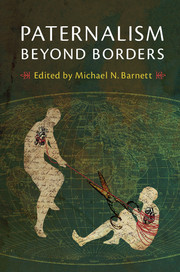Book contents
- Frontmatter
- Contents
- Notes on Contributors
- Acknowledgments
- Introduction: International Paternalism: Framing the Debate
- Part I The Boundaries of Paternalism
- Part II Paternalism, Old and New
- Part III The Social Relations of Paternalism
- 5 Paternalism and Peacebuilding: Capacity, Knowledge, and Resistance in International Intervention
- 6 Enabling or Disabling Paternalism: (In)attention to Gender and Women's Knowledge, Capacity, and Authority in Humanitarian Contexts
- 7 The Limits of Consent: Sex Traffi cking and the Problem of International Paternalism
- 8 Modernity at the Cutting Edge: Human Rights Meets FGM
- 9 Humanitarian Refusals: Palestinian Refugees and Ethnographic Perspectives on Paternalism
- Conclusion: The World According to Paternalism
- Index
9 - Humanitarian Refusals: Palestinian Refugees and Ethnographic Perspectives on Paternalism
from Part III - The Social Relations of Paternalism
Published online by Cambridge University Press: 01 December 2016
- Frontmatter
- Contents
- Notes on Contributors
- Acknowledgments
- Introduction: International Paternalism: Framing the Debate
- Part I The Boundaries of Paternalism
- Part II Paternalism, Old and New
- Part III The Social Relations of Paternalism
- 5 Paternalism and Peacebuilding: Capacity, Knowledge, and Resistance in International Intervention
- 6 Enabling or Disabling Paternalism: (In)attention to Gender and Women's Knowledge, Capacity, and Authority in Humanitarian Contexts
- 7 The Limits of Consent: Sex Traffi cking and the Problem of International Paternalism
- 8 Modernity at the Cutting Edge: Human Rights Meets FGM
- 9 Humanitarian Refusals: Palestinian Refugees and Ethnographic Perspectives on Paternalism
- Conclusion: The World According to Paternalism
- Index
Summary
The aim of this chapter is to develop an analysis of actually-existing paternalism. I mean this in much the same way that people talk about actually-existing cosmopolitanism, neoliberalism, and democracy to suggest that an understanding of any of these concepts requires capturing the complexity of experience and building a theory of the concept from that complexity. From an “actually-existing” perspective, the contradictions and messiness of lived paternalism (or anything else) neither needs to be explained away as deviations from a model nor does it serve as evidence that a circumstance is not a case of paternalism. Rather, this experience provides the grounds for understanding what paternalism might actually be in the world. Thinking about actually-existing paternalism can help avoid a conceptual cul-de-sac wherein paternalism is defined so narrowly as to make it essentially unreal. If one can identify paternalism only in cases where the motives for intervention are entirely altruistic (not returning any kind of benefit to the intervener), for instance, then paternalism seems more like a unicorn than a horse: something that can be described, but never encountered in the world. To capture what paternalism actually is in the world, an ethnographic perspective is, if not vital, certainly extremely helpful. Ethnography, whether the face-to-face interactions of classical fieldwork or ethnographic readings of archives and other texts, builds theory from the ground up. It starts, though does not necessarily end, with the subjects’ perspective.
Any consideration of paternalism has to think about the question of its subjects, even if these are often abstract rather than actual subjects. But most reflections on the ethics of paternalism begin from the perspective of the (potential) paternalist. It is the intervener who is the key actor in these concerns and the one who is asked to think about the ethics and politics of his or her actions and interventions. So even as the liberal theory of paternalism claims to start from a presumption of fundamental equality – each person posited as a rational actor who can expect non-interference – it is in fact ensconced in the hierarchies that make up actual people and relationships.
- Type
- Chapter
- Information
- Paternalism beyond Borders , pp. 292 - 315Publisher: Cambridge University PressPrint publication year: 2016
- 2
- Cited by



